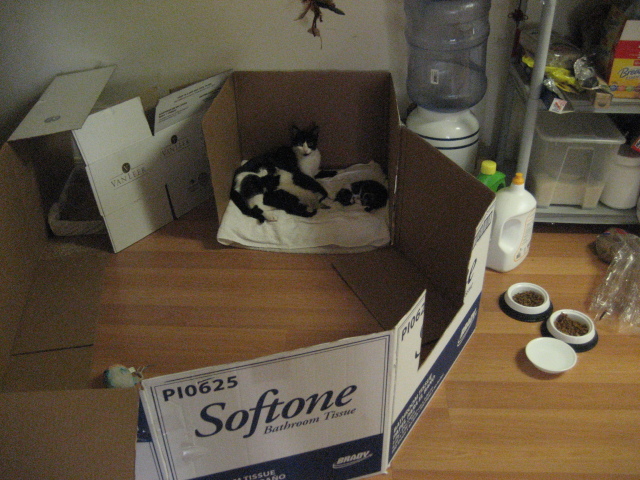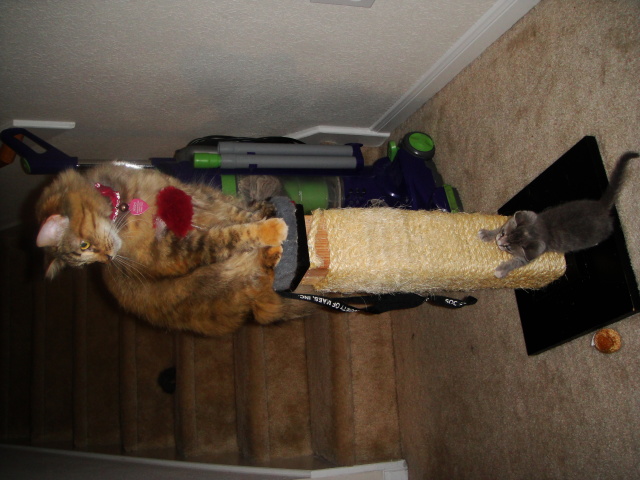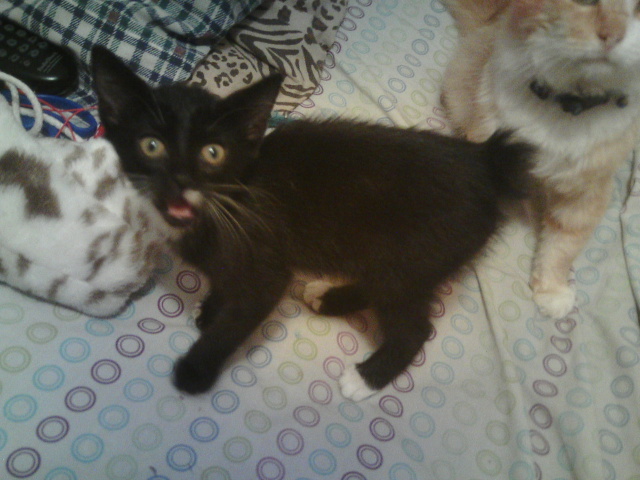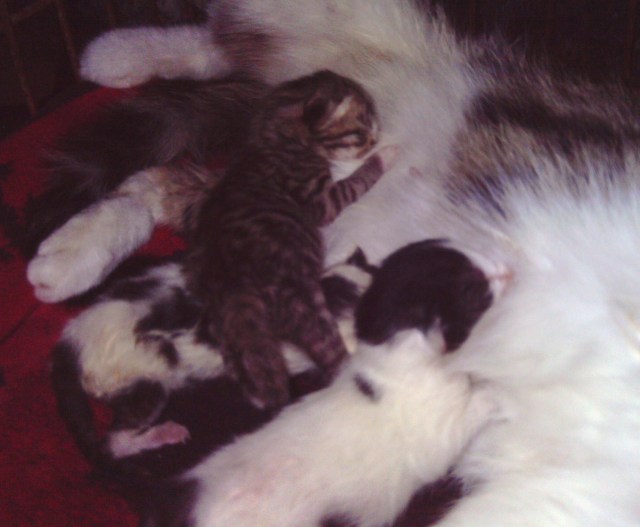QuestionQUESTION: Hi,
We have a 16 year old, neutered, tan and white tabby. His eating and litter box usage is normal. Over the last year he has started urinating in various locations in our house. His favorite place is in the corners of our dining room. He also spends a good deal of his waking time crying, especially in the very early morning hours. During the day when we're home he roams around the house crying incessantly until one of us pays attention to him. Once playtime is over he either goes to sleep or starts crying again. If we ignore him he sometimes marches into the dining room a urinates on the wall and carpet as if out of spite. He has recently lost his hearing. We've had him to the vet and they've given him antibiotics but there hasn't been any sign of urinary infection or tooth pain. Could the hearing loss be causing this erratic behavior? We do have a second cat who he taunts frequently to establish dominance, but they've been together for 12 years now. Both cats are declawed in the front and have been lifelong indoor cats. We've been in our current house for almost 4 years now. We are stumped. Any help would be appreciated.
Thanks,
John
ANSWER: John,
I would suggest that you have a complete set of blood work done on the offending kitty. There may be something wrong with his health that will show up in the blood work. I am wondering specifically about things like thyroid function, kidney and liver function. The only way to find out if loss of hearing has anything to do with it would be to wait until he is occupied and then make a loud sound that he can't see any cues for. If he reacts then it probably isn't his hearing, but if you want to be 100% sure then I would suggest that you ask your vet to check his ears. The fact that the urinating outside the litter pan is accompanied by frequent vocalisations makes me wonder about things like crystals in his urine or urinary tract infections. The only way to solve this problem would be to work through testing and diagnosis with your vet. I have heard about things like diabetes and thyroid issues causing increased vocalisation and inappropriate elimination. I hope that these tips will be helpful in discovering what is going on with your little man, and hopefully with the vet's help things can return to normal. Given his age you may also want to ask about dementia/senility being related to this issue. I am sorry that I couldn't offer more specific advice. If you have any further questions or concerns, please do not hesitate to contact me again.
---------- FOLLOW-UP ----------
QUESTION: Ali,
Thanks so much for your quick response. In my initial post I forgot to mention that he did have the extensive blood work done about 2 months ago and everything showed up normal. In fact the vet was surprised at how normal all his numbers looked considering his age. I like your suggestions regarding urine crystals and dementia/senility. These I will bring up with the vet during our next visit. One thing our vet mentioned was that arthritis/joint pain could be a possibility. That sounds credible since he is most vocal right after waking up. If I were to guess I'd say his hearing loss is in the 80% to 90% range. If we yell loud enough he will hear something and come running but if we walk up behind him and clap our hands he doesn't budge. We almost get the impression at times that his vocalizing might be his frustration at not being able to hear himself or others. So that if he cries loud enough he might hear a response. In any case we shall push forward in search of a resolution. Thanks again for your help.
John
AnswerJohn,
Of interest you may find that if you pick your kitty up and speak with a low tone directly against the side of his head he most likely will hear you. That is something that I have observed with deaf animals as well as people who weren't aware that their child was deaf at birth...As for the arthritis treatment you can ask your vet about a drug called Metacam, it was originally designed for dogs, but my vet does use it in smaller quantities to treat pain in cats and because it is an anti-inflammatory it may help reduce your little guys' discomfort. I would suggest that you pick up either at a pet store or a human medical supply warehouse either the disposable or washable incontinence pads and place them in areas that he generally makes mistakes in, they can also be a good furniture saver, but you may want to remove them before you have company as explaining their presence just isn't something I would want to do....Hopefully you are able to find some solutions, imagination will be your guide in this search...It sounds to me like although your kitty is quite vocal he is happy and healthy enough, so it is a question of finding solutions that work for you and that make him feel like he is being heard. Hope all goes well! If you have any further questions or concerns, please do not hesitate to contact me again.

 mother cat needs?
Questionplay area
QUESTION: hi Jessica, my mothe
mother cat needs?
Questionplay area
QUESTION: hi Jessica, my mothe
 Kitten weaning questions
QuestionI just recently rescued a kitten of about 4 wee
Kitten weaning questions
QuestionI just recently rescued a kitten of about 4 wee
 what breed is my bobtail kitten?
Question
Midnight
About a month ago I got a little bobt
what breed is my bobtail kitten?
Question
Midnight
About a month ago I got a little bobt
 Labor Stalled?
QuestionQUESTION: Recently a very pregnant cat adopted
Labor Stalled?
QuestionQUESTION: Recently a very pregnant cat adopted
 One month old Kitten
Question
The one month old, aka
I have tried bef
One month old Kitten
Question
The one month old, aka
I have tried bef